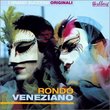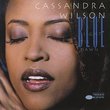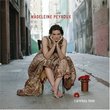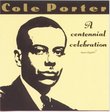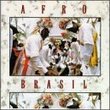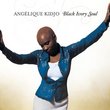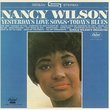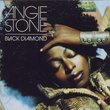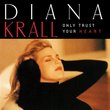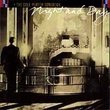| All Artists: Spanish Harlem Orchestra Title: Un Gran Dia En El Barrio Members Wishing: 0 Total Copies: 0 Label: Rope a Dope Release Date: 9/17/2002 Genres: International Music, Latin Music Styles: Tropical, Salsa Number of Discs: 1 SwapaCD Credits: 1 UPCs: 014431601224, 075679313522, 821838293422 |
Search - Spanish Harlem Orchestra :: Un Gran Dia En El Barrio
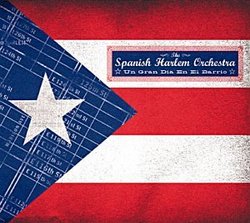 | Spanish Harlem Orchestra Un Gran Dia En El Barrio Genres: International Music, Latin Music
This record is Spanish Harlem's answer to Cuba's Buena Vista Social Club. Slipcase. Ropeadope Records. 2002. |
Larger Image |
CD DetailsSynopsis
Album Description This record is Spanish Harlem's answer to Cuba's Buena Vista Social Club. Slipcase. Ropeadope Records. 2002. Similar CDsSimilarly Requested CDs
|
CD ReviewsNuyorican vs Cuban - There is a difference Daniel Fernandez | Sydney, New South Wales Australia | 07/04/2004 (3 out of 5 stars) "First of all, on the record, it's a decent album. But the new album - Across 110 st - is better. But the bolero "Obsesion" is done perfectly and is worth the CD just for that. Further "Vale Mas Un Guaguanco" is slamming. Again though, the new album is better, if only it has Ruben Blades on 4 tracks. Also, comparing Buena Vista Social Club (BVSC) to Spanish Harlem orchestra is like comparing Apples to Oranges. BVSC are firmly rooted in the Cuban "salsa" tradition, whereas SHO are rooted in the Nuyorican tradition. There is a distinct difference (read below). Also complaining about the voices of Ferrer and Portuondo is silly because they are both elderly and there best days are behind them. There is no way they could sound as good as younger singers in their prime.Now, on this Puerto Rican - Cuban feud. I think I can speak ojectively because my father is Spanish, my mother Peruvian, and I was born in Australia. I have no alegiance to either side (except that I do prefer Nuyorican-salsa dura to Cuban salsa-guaguanco, etc) . Also I am 27 but am a lover of Latin American music in general and I devour it. So here it is. The Cubans no doubt invented forms that would lead and formed the base of salsa - for example Guaguanco, Montuno, etc - but they did not invent salsa. Salsa is the music that came out of New York in the late 60's and 70's (and indeed the term didn't even get used to describe the music until mid 70's). Nobody was calling Cuban music "salsa" prior to the 70's. Salsa was used to describe the music coming from New York (and the Puerto Rican community) and the Fania label as well as the stuff on the Tico and Inca labels. Then it got adopted by every other music with a clave and is even used to describe certain manufactured pop artists (whom I won't name). On the music itself, listen to a Sonora Matancera record and then compare it to Sonora Poncena. They are different forms of music. It's like comparing Benny Goodman to Count Basie. The fact is the "salsa" music coming out of New York/Puerto Rico in the 70's was a hybrid of Cuban music, funk, jazz, and soul. It was much more open to influence and is much more dynamic - Nuyorican salsa is disco whereas Cuban is ballroom. Willie Colon even chopped up the sacred clave so that it was almost unrecognizable, a Cuban would never have done that. One last gripe, I keep hearing how Salsa Timba is so fresh and new and how they are mixing R&B and jazz with salsa (they don't even do it very well). What's so new about it? Wasn't this what salsa was in the 70's from New York. I challenge anyone to listen to Hector Lavoe's La Voz album (as well as countless of Colon, Barretto, Palmieri, Blades tracks) from the mid 70's and tell me that the album isn't littered with funk, soul, and jazz references from the beginning to the end. I give love to both salsa communities (Puerto Rica and Cuba) but its about time Cubans stopped saying that Nuyorican salsa is just a badly made version of Cuban music. The Nuyoricans took Cuban music to a whole new level of experimentation and energy and created a new form that should be recognised.Finally, it's amazing how little recognition is given to the Latino community of New York for creating salsa. It is a forgotten story and a little known fact (even amongst some latinos). I speak to Australian's (even some latino-Autralians) who wouldn't have the first clue about how important New York Puerto Ricans were to salsa history. They just assume its all from Cuba and its all the same music. From what I understand its a similar issue in the US where latino contribution to music and culture is not understood or acknowledged. When pop artists get called salsa you know there is a problem.Buy the album" A documentary of Spanish Harlem?s music traditions Mariela Perez | North Carolina | 02/27/2003 (5 out of 5 stars) "Composed of 13 New York Salsa pioneers The Spanish Harlem Orchestra had one main goal when they set up to record Un Gran Día en el Barrio- to freshen up the invigorating sounds of 60's and 70's salsa. Oscar Hernandez (who's credit list goes from creating the theme song from HBO's "Sex and the City" to working with Tito Puente and Paul Simon) directed this group of musicians who had never before worked together, but whom innately shared the powerful history of the rhythm. The album opens with Tito Rodriguez' "Mama Guela," and also includes tracks such as Willie Colon and Hector Lavoe's "Llegó la Banda," the popular bolero "Obsesión," and the well-known "Somos Iguales." Un Gran Día en el Barrio might be a lively danceable album that everyone can enjoy, but above all, Un Gran Día en el Barrio is a documentary of Spanish Harlem's music traditions where the true soul of salsa is captured." El Poder de la Salsa zahnmann | 01/29/2003 (5 out of 5 stars) "Wonderful CD for those of us who DJ get it own it. Infectious grooves and sexy rhythms only enhance the experiance. I recommend it for those people who want to hear Salsa as it should be played. True soneros who use of voice add to the beat. For those people experiancing salsa for the first time do not confuse Marc Anthony for a salsero. ....."
|

 Track Listings (10) - Disc #1
Track Listings (10) - Disc #1